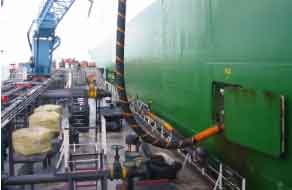Last week, Maersk announced a controversial plan for new fuel surcharges to help recover the additional costs of low-sulfur marine fuel and/or scrubbers, scheduled to be introduced in January.
As SCDigest has reported several times, in April there were new rules coming out of the International Maritime Organization (IMO) that will require cargo ships to either use new very low sulfur fuels or install very expensive scrubbers at the tune of multiple millions of dollars each.
Supply Chain Digest Says... |
|
|
The new rules are scheduled to go into effect Jan. 1, 2020 – 15 months away.
Observers have warned the rules could cripple the already financially struggling cargo carriers with much higher fuel and/or scrubber costs that the lines will be unable to cover with surcharges to shippers. In fact, the CEO of one carrier said the rules could cause bankruptcies for some companies.
"We're all going to go bust," Junichiro Ikeda, CEO of Japanese container carrier MOL, said in June. (See Will New Low Sulfur Fuels Cause Cargo Ship Engines to Shut Down?).
The new charges, on top of existing contract rates, are meant to compensate Maersk for the high cost of the expensive new scrubbers or a switch to more expensive fuels. They will be based on the average cost of fuel and a mysterious "trade factor" that takes into account cargo flows, with lower charges for backhauls.
This week, the just-style.com web site reported that Maersk – the world's largest container carrier - insists the new surcharge has been "well received" by customers. However, the British International Freight Association (BIFA) says that the program is "unjustified" and "exploits the situation."
Maersk ships will be fitted with engines that can run on liquid natural gas or add the new scrubber technology. To recoup the higher costs, Maersk has introduced a Bunker Adjustment Factor (BAF) to help customers predict, plan and track how changes in fuel price will impact total shipping freight rate - an update to the existing SBF surcharge that is based on "several variable factors". The BAF will replace the existing Standard Bunker Factor (SBF) and allows customers to simulate and calculate the BAF tariff at any time, Maersk says.
Many shippers are howling.
First, some critics note that Maersk is introducing the scheme a year before the higher fuel prices come in – though of course some of investments will precede the deadline in order for Maersk to be ready to comply.
"Asking customers to contribute to new environmental costs is to be expected, but this charge lacks transparency; no data is available to let customers work out how the charge has been calculated," said James Hookham, secretary general of the Global Shippers' Forum, last week.
(See More Below)
|
CATEGORY SPONSOR: SOFTEON |
|
|
| |
|
|
Hookham added that "Given historical experiences with surcharges, shippers are naturally suspicious" of the move.
 He also said the Global Shippers' Forum, which is a trade group for ocean shippers, "will be taking this piece of financial engineering apart piece by piece, as we suspect this has more to do with rate restoration than environmental conservation." He also said the Global Shippers' Forum, which is a trade group for ocean shippers, "will be taking this piece of financial engineering apart piece by piece, as we suspect this has more to do with rate restoration than environmental conservation."
He added that Maersk could have chosen to fit scrubbers on all its ships, triggering a one-off expense, as some of its rivals are doing. Many shippers believe this is a better option than paying sulfur surcharges indefinitely.
The surcharges can certainly be hefty. BIFA estimates, for example, that the surcharge for moving a 40-foot container from Asia to Northern Europe could rise from $480 to $840 as a result of the new regime.
"Rises of this magnitude are unjustified, and could be construed as blatant profiteering by shipping lines determined to exploit the situation," said BIFA director general Robert Keen.
The big question, of course, is whether other shipping lines will follow in Maersk's wake and try to impose similar new fuel surcharges, and in fact MSC and CMA CGM just this week announced similar surcharge programs.
CMA CGM said "all these measures represent a major additional cost" which it estimated, based on current conditions at an average of $160 per TEU, or $320 for a 40-foot container.
What's your view of these new fuel surcharges? Let us know your thoughts at the Feedback section below.
Your Comments/Feedback
|